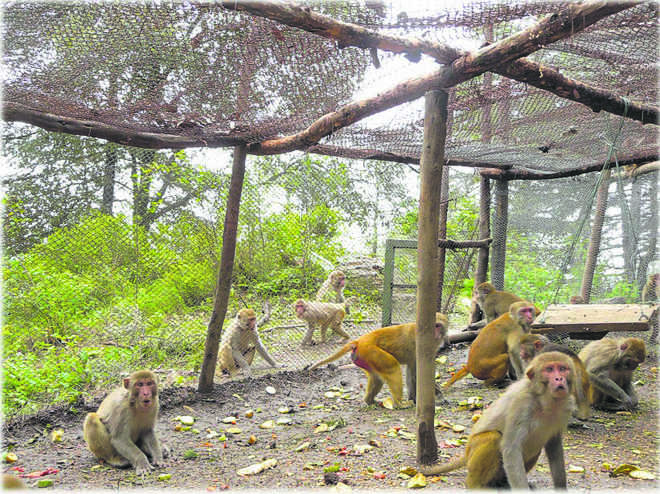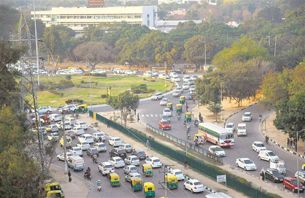
The marauding monkey armies today have laid waste vast farmlands, as crops cannot be saved. File photos
Ravinder Makhaik
‘Save us from monkeys’ plead farmers and residents across many districts as relocation, sterilisation programmes and even by declaring them vermin for a mass cull, fail to contain the exploding simian population.
It’s a grievance that has been ringing in the hills for over two decades now and all efforts to contain the man-monkey conflict have failed with the monkey winning successive battles.
“Stepping out of the house is entering a monkey war zone,” says Anita Khanna, a senior citizen, who in October launched a signature campaign demanding security from the animal.
Women, children and senior citizens are soft victims, who often get attacked. “People are unsafe in their own homes,” says Anita, adding: “Caging yourself with a strong wire mesh on windows and balconies has become essential.”
She found out that between January and September, just one hospital in the city had treated 1,022 monkey-bite victims.
For its rich forest cover, containing the monkey population is probably as old as when the British first laid the foundation of the hill town in the 19th Century. The stern colonial civic authorities, too, failed to rid the posh town of its monkeys even after having permitting mass shootings.
Largely an urban problem till about 30 years ago, the marauding monkey armies today have laid waste vast farmlands, as crops cannot be saved.
A Forest Department Census shows that in less than 15 years (1990-2004), the monkey population in the state has exploded over five times from about 61,000 to 3,17,000.
One reason cited for such population growth is a ban on export of monkeys for scientific experiments imposed in 1978, but wildlife officer Sandeep Rattan in the book ‘Monkeys on the Edge’ points out that continual feeding by tourists and religious devotees has aggravated the problem. Monkeys have left their natural surroundings and adapted to an easier way of life to forage in garbage dumps and along highways, he notes.
Farmer organisations blame the 2004-06 translocation programme that introduced captured troupes into rural and other non-conflict areas. The problem spread to farms and multiplied. A 2014 report of Agriculture Department estimated annual damage to crops from wild animals, mainly from monkeys, at Rs 184 crore.
In response to ‘Kheti Bacchao’ an ongoing protest since 2005 spearheaded by former Indian Forest Services officer Kuldeep Tanwar of Himachal Kisan Sabha, the state responded by starting an artificial sterilisation programme in 2007.
Ambitious targets were set out to contain the outgrown population in 3 to 5 years. After having spent over Rs 21 crores, by December 23, 2018, the eight state-of-the-art sterilisation centres have operated 1,50,837 monkeys with the Forest Department laying claim that the programme was having an impact.
From a population of 3,17,512 in 2004, a department report holds that the monkey numbers dwindled to 2,26,086 in 2013 and 2,07,614 in 2015.
“If that was so, why would the Central Ministry of Environment and Forests declare monkeys vermin?” contests Tanwar.
Monkeys in 38 rural tehsils of Himachal and Shimla municipality were declared vermin (fit for a mass cull to rebalance the population) on March 14, 2016, to “mitigate the damage to human life, crops and other properties under the Wild Life (Protection) Act, in 2016”.
The Forest and Wildlife Department announced a cash award for each monkey killed in the permitted zones. The cull permission ended on December 20, 2018, and in over two years, only five monkeys were culled, Forest Minister Govind Thakur stated in the Vidhan Sabha recently.
Presiding over a meeting of forest and wildlife officers before the culling notification expired, Chief Minister Jai Ram Thakur said he had approached the Centre to declare monkeys vermin in 53 more tehsils.
With the cull proving a non-starter, Tanwar says: “The state has abdicated its responsibility. Instead of leading a scientific culling, the Forest and Wildlife Department passed the responsibility onto the affected people, who don’t have the expertise, are not trained, nor have guns to do culling.”
"Stepping out of the house is entering a monkey war zone. Women, children and senior citizens are soft victims, who often get attacked. People are unsafe in their own houses. Caging yourself with a strong wire mesh on windows and balconies has become essential.I have found out that just one hospital in the city had treated 1,022 monkey-bite victims between January and September."
Anita Khanna, A senior citizen, who in October launched a signature campaign demanding security from the animal



























